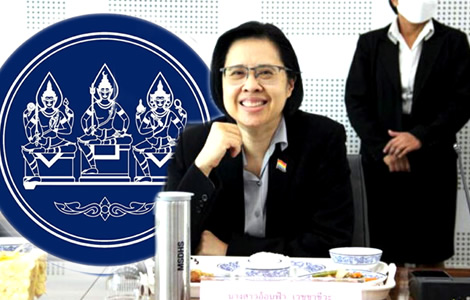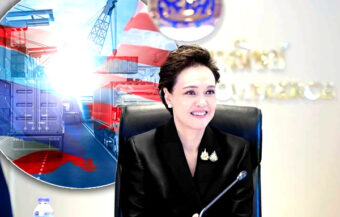Thailand faces a major economic shake-up as Ms. Onfa Vejjajiva takes charge of NESDC on October 1 alongside the new Bank of Thailand Governor, marking a leadership milestone and urgent calls for reforms to revive the faltering economy.
The Cabinet’s Tuesday appointment signals a major shake-up in Thailand’s economic leadership. At the NESDC, a 55-year-old career civil servant will take the reins as Secretary-General, joining the new Governor of the Bank of Thailand, Vitai Ratanakorn, who assumes office simultaneously. Outgoing NESDC chief Danucha Pichayanan delivered a final warning to policymakers, stressing that the government cannot delay urgent restructuring of Thailand’s faltering economy—a concern echoed by outgoing Bank Governor Sethaput Suthiwartnarueput.

On Tuesday, the Thai Cabinet approved the appointment of Ms. Onfa Vejjajiva as the new Secretary-General of the National Economic and Social Development Council (NESDC). She will assume the post on October 1, replacing Mr. Danucha Pichayanan, who has led the agency for five years. Notably, this makes her the first woman to head the 75-year-old institution.
The NESDC is a central agency responsible for evaluating Thailand’s economic performance. It calculates quarterly GDP figures, monitors national development indicators and advises the government on long-term policy. Moreover, it is known for its independence and evidence-based recommendations. These assessments inform five-year economic and social development plans.
Ms. Onfa, 55, currently heads the Office of the Public Sector Development Commission (OPDC). She has more than 24 years of public service experience, beginning as a government fellow and later joining the Cabinet Secretariat.
Ms Onfa brings decades of civil service experience and NESDC board insight ahead of transition
In 2017, she became Deputy Secretary-General of the Cabinet Secretariat. Subsequently, she moved to OPDC in 2019 and became Secretary-General in 2020. Additionally, she has served as an ex officio member of the NESDC board, giving her direct insight into the agency’s operations.
Although she is related to former Prime Minister Abhisit Vejjajiva and People’s Party spokesperson Parit Wacharasindhu, Ms. Onfa has never held elected office. Instead, she has risen through merit in the civil service.
Furthermore, she has consistently emphasised efficiency, objectivity and fact-based policy analysis. In interviews, she described herself as conscientious and straightforward, prioritising clarity over diplomacy.
Academically, Ms. Onfa holds a degree in International Economics from Chulalongkorn University. She also earned a Master of Science in Policy Economics from the University of Illinois at Urbana-Champaign and a Master of Public Policy from Japan’s National Graduate Institute for Policy Studies (GRIPS). Although her scholarship required only four years of service, she stayed for 24 years, gaining extensive administrative and policy experience.
Ms Onfa’s academic and policy expertise underpin her leadership role at NESDC and in government
Her career demonstrates steady progression. In 2010, she began in IT systems at the Cabinet Secretariat. By 2017, she had risen to Deputy Secretary-General.
Additionally, her service on the NESDC board provides continuity and understanding of the agency’s functions. In January 2025, her OPDC board term was extended to February 2026, underscoring the government’s confidence in her leadership.
Ms. Onfa is also recognised for her leadership style. She believes women leaders often help reduce tension in high-pressure meetings. Thus, they can achieve compromises and smooth decision-making. Nevertheless, she acknowledges that traditional male hierarchies still exist in certain sectors. Even so, she notes that Thai society provides comparatively strong opportunities for women.
In support of her view, the Ministry of Social Development and Human Security reported in 2024 that women hold 25% of public sector leadership roles. Additionally, 27.7% of corporate employers are women. While not complete parity, these figures reflect notable progress in Thai leadership diversity.
Ms Onfa emphasises gender inclusion and leadership skills to navigate high-pressure policymaking roles
Meanwhile, outgoing NESDC chief Danucha Pichayanan, on Wednesday, stressed the need for urgent economic reform. He argued that Thailand’s growth has remained sluggish, averaging 1.9% annually over the past decade.
The NESDC projects growth of 2% in 2025, down from 2.5% in 2024. In 2020, the economy contracted by 6% due to the pandemic. Consequently, he warned that structural weaknesses could leave Thailand lagging behind regional peers.
He highlighted the industrial sector as a key area for reform. Thai manufacturing still focuses on conventional goods, while neighbouring countries have upgraded through research and innovation.
Significantly, he emphasised that higher-value production is essential to increase competitiveness and sustain growth. Investments in R&D, technology adoption, and workforce development were central to his recommendations.
Similarly, he noted challenges in agriculture. Most products remain basic commodities with limited value addition. Therefore, modernisation must include improved cultivation methods, mechanisation and research-guided production.
Structural economic reform in industry and agriculture is critical to restoring competitiveness and growth
Additionally, subsidies alone are insufficient, as they reduce incentives for farmers to adjust to market conditions. For example, government interventions in rice production often create fiscal burdens. Thus, he advocated redirecting support toward innovation and efficiency rather than output volume.
On fiscal policy, Mr. Danucha warned that Thailand’s budgetary space is limited. Expanding fiscal capacity requires steady growth. Revenue increases must be paired with efficient public expenditure. For instance, healthcare costs vary significantly across hospitals and lack uniform standards. Consolidation and streamlined frameworks could free resources for development projects.
He also highlighted Thailand’s dependence on exports. While exports are vital, over-reliance increases vulnerability to global market fluctuations. In contrast, expanding domestic demand would strengthen the economy.
Just this week, he warned about a new credit phenomenon in Thailand as the country struggles with reduced liquidity in the system. Certainly, this is caused by 13 months of reduced bank lending. In response, retailers and some service providers are offering payment by instalment plans. This undoubtedly is a negative development and highlights a deterioration in the health of the underlying economy.
Economic reforms dealing with fiscal limits, export dependence and domestic demand to ensure stability
Nevertheless, household debt remains high, limiting consumption. As a result, private spending grew only 2.7% in 2025, well below historical levels. Consequently, job creation and income growth are necessary to stimulate domestic demand.
Bank of Thailand Governor Sethaput Suthiwartnarueput, who is also stepping down in October, echoed Mr. Danucha’s concerns. Both leaders argued that monetary policy alone cannot compensate for structural deficiencies. Reforms across industry, agriculture and fiscal management are critical to sustainable growth. Otherwise, Thailand risks continuing as Southeast Asia’s “sick man,” trapped in low growth.
Ms. Onfa will lead the NESDC at a pivotal moment. Her expertise in policy evaluation, public-sector reform, and administrative leadership equips her to guide evidence-based decisions. Moreover, her familiarity with the board ensures continuity during the transition. Her appointment also signals increased gender representation at the highest levels of government.
Ms Onfa’s leadership at NESDC will guide policy, ensure continuity and promote evidence-based action
Observers note that her tenure will be measured by the agency’s ability to provide accurate economic assessments and policy recommendations.
Significantly, the NESDC’s advice shapes five-year national plans, investment frameworks and long-term fiscal strategy. Consequently, her leadership will influence the allocation of resources and the implementation of economic reforms.
Printing money, allowing more liquidity and a cheaper baht may be the economic medicine Thailand needs
Rate cut anticipated as outgoing Bank of Thailand governor attends last Monetary Policy Committee
Finance Ministry & central bank move to boost credit by shifting non-performing debt into asset firms
Top Banker to the less well off tipped as next Bank of Thailand boss when the cabinet meets next week
In conclusion, Thailand faces pressing economic challenges. Industrial modernisation, agricultural reform, fiscal consolidation and domestic consumption growth are essential. Ms. Onfa’s appointment represents both a strategic and symbolic milestone.
Her leadership will determine how effectively Thailand addresses structural weaknesses. Meanwhile, sustained monitoring, data-driven policy and administrative integrity will be critical to the country’s economic future.
Join the Thai News forum, follow Thai Examiner on Facebook here
Receive all our stories as they come out on Telegram here
Follow Thai Examiner here
Further reading:
Rate cut anticipated as outgoing Bank of Thailand governor attends last Monetary Policy Committee
Last minute tweaks in Bangkok as deal is finalised with U.S. However, Thailand may not match Vietnam


















